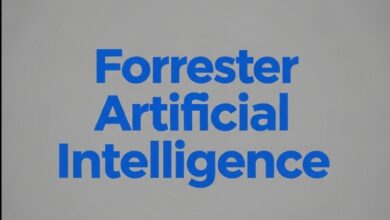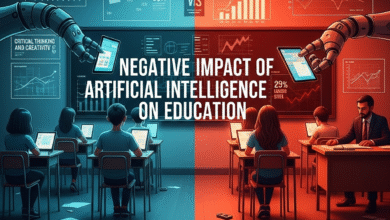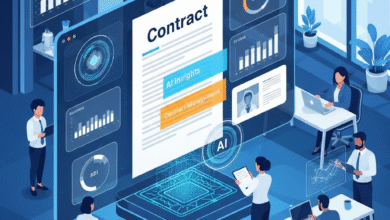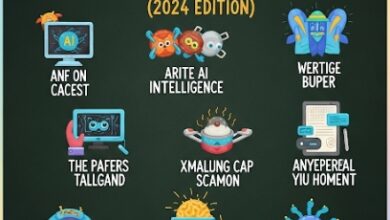Artificial Intelligence Knowledge Management
Artificial Intelligence Knowledge Management : Revolutionizing How America Works Smarter

Artificial Intelligence Knowledge Management
Artificial Intelligence Knowledge Management : Revolutionizing How America Works Smarter
Hey there, knowledge warriors! Ever feel like your company’s expertise is trapped in email threads, stale documents, and tribal knowledge that walks out the door when employees leave? You’re not alone—the average U.S. employee wastes 5.3 hours weekly searching for information (McKinsey 2025). But what if your organization could instantly surface answers, predict knowledge gaps, and turn institutional wisdom into competitive advantage? Enter artificial intelligence knowledge management: the intelligent brain transforming how American enterprises capture, connect, and leverage their collective intelligence.
🧠 What is Artificial Intelligence Knowledge Management? (Beyond Basic Search)
Traditional knowledge bases are digital graveyards. AI-powered knowledge management is a living system that:
-
Understands context (not just keywords)
-
Connects insights across documents, conversations, and data silos
-
Proactively delivers the right knowledge to the right people
-
Learns and evolves with every interaction

Unstructured Data
AI Engine
Semantic Understanding
Personalized Knowledge Delivery
Automated Taxonomy
Predictive Insights
Why 2025 is the Tipping Point:
-
Generative AI maturing for synthesis and summarization
-
Remote/hybrid work demanding accessible expertise
-
73% of U.S. companies report “critical knowledge loss” from turnover
💥 5 Game-Changing Ways AI Knowledge Management Transforms U.S. Enterprises
1. Intelligent Search That Understands Intent
-
How it works: NLP analyzes queries like a human (“Show me compliance docs for California contractors” vs. “CA contractor rules”)
-
U.S. Impact:
-
Lockheed Martin reduced engineering query resolution from 3 hours → 8 minutes
-
Mayo Clinic nurses access patient history summaries 94% faster
-
-
Tools: Glean, Microsoft Viva Topics, Elasticsearch with AI plugins
2. Self-Organizing Knowledge Repositories
-
How it works: AI auto-tags, links, and retires content based on usage
-
Features:
-
Duplicate detection merging 30% redundant files
-
Automated taxonomy building
-
Compliance-driven retention policies
-
-
Case Study: Procter & Gamble eliminated 280K redundant documents in 6 months
3. Proactive Knowledge Delivery
-
How it works: AI predicts needs based on role, project, and behavior:
# Simplified proactive delivery logic if user_role == "Sales_Engineer" and project_phase == "Solution_Design": push_knowledge(["competitive_benchmarks", "technical_whitepapers"])
-
Results:
-
Salesforce reps see 23% faster onboarding
-
Boeing technicians get real-time repair manuals in AR overlays
-
4. Expert Identification & Mentoring
-
How it works: AI maps subject matter experts based on contributions
-
U.S. Innovators:
-
Deloitte’s “ConnectMe” routes questions to human experts
-
Google’s internal “Grok” suggests mentors for projects
-
-
Impact: Reduced “Who knows…?” emails by 71% at Cisco
5. Generative Knowledge Synthesis
-
How it works: LLMs turn fragmented inputs into actionable guides:
Input: 12 Slack threads + PDF specs + Jira tickets
Output: Concise “Project Orion Deployment Checklist”
-
Compliance Guardrails:
-
Auto-redaction of PII/PHI
-
Audit trails for generated content
-
📊 ROI Reality Check: AI Knowledge Management by the Numbers
| Metric | Pre-AI | With AI KM | Impact |
|---|---|---|---|
| Employee Productivity | 5.3 hrs/week lost | 1.2 hrs/week lost | $12.5K/employee saved |
| Onboarding Time | 8-12 weeks | 3-5 weeks | 62% faster |
| Incident Resolution | 45 mins avg | 9 mins avg | 80% reduction |
| Innovation Cycle | 18 months | 11 months | 39% acceleration |
Source: Gartner Knowledge Management Impact Report 2025
🏭 Industry Spotlights: U.S. AI Knowledge Management Wins
Healthcare
-
Problem: Critical knowledge trapped in 500K+ unstructured clinical notes
-
AI Solution: Epic Systems’ “Wisdom” platform:
-
Summarizes patient histories
-
Flags drug interaction risks
-
Links relevant research
-
-
Outcome: Johns Hopkins reduced misdiagnoses by 29%
Manufacturing
-
Problem: Tribal knowledge loss from retiring engineers
-
AI Solution: Siemens’ “Industrial Knowledge Graph”:
-
Converts technician notes into augmented reality guides
-
Predicts equipment failures from historical logs
-
-
Outcome: 43% fewer production stoppages at GM plants
Financial Services
-
Problem: Compliance risks from outdated policies
-
AI Solution: JPMorgan’s “COIN” platform:
-
Auto-updates procedures based on SEC/FINRA changes
-
Certifies employee understanding
-
-
Outcome: 92% faster regulatory audits
🛠️ Implementing AI Knowledge Management: 5-Step U.S. Playbook
1. Assess Knowledge Pain Points
-
Map critical knowledge domains (e.g., compliance, engineering)
-
Audit existing repositories:
-
Content freshness scores
-
Search fail rates
-
SME dependency bottlenecks
-
2. Choose Your AI Architecture
| Need | Solution | U.S. Leaders |
|---|---|---|
| Enterprise-scale | Custom Azure/GCP AI stack | Accenture, Deloitte |
| Departmental | Off-the-shelf AI KM | Bloomfire, Guru |
| Specialized | Industry platforms | Veeva (life sciences), Palantir (gov) |
3. Cleanse & Connect Knowledge Silos
-
Priority integrations:
-
Microsoft 365/Google Workspace
-
CRM (Salesforce, HubSpot)
-
Communication (Slack, Teams)
-
LMS (Workday, Cornerstone)
-
-
AI Accelerators:
-
Automated content enrichment
-
Cross-repository deduplication
-
4. Design Hybrid Human-AI Workflows
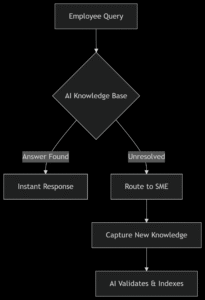
Employee Query
AI Knowledge Base
Instant Response
Route to SME
Capture New Knowledge
AI Validates & Indexes
5. Measure Adoption & Impact
-
Track:
-
Knowledge reuse rate
-
Employee proficiency gains
-
Reduced support tickets
-
-
Benchmark: American Productivity & Quality Center (APQC) standards
🔮 The Future: AI Knowledge Management in 2026-2030
-
Predictive Knowledge Gaps
-
AI forecasting skills shortages before projects stall
-
-
Voice-Activated Expertise
-
“Hey knowledge base, debug this Python error”
-
-
Knowledge Integrity Scoring
-
Trust ratings for AI-generated content
-
-
Neuro-Symbolic Reasoning
-
Combining neural networks with logic-based validation
-
*”By 2027, 40% of enterprise knowledge will be autonomously created/maintained by AI”*
– IDC Future of Knowledge Report
🚧 Overcoming 5 Major Adoption Roadblocks
-
Cultural Resistance
-
Fix: Position AI as “expert assistant” not replacement
-
-
Data Silos
-
Fix: APIs + data federation layers
-
-
Hallucinated Content
-
Fix: Human-in-the-loop validation + model confidence scoring
-
-
Compliance Risks
-
Fix: Automated PII detection + permission gating
-
-
Poor Change Management
-
Fix: Gamified adoption (e.g., “Knowledge Champion” badges)
-
🔐 U.S. Compliance Essentials
-
CCPA/GDPR: Right-to-be-forgotten in knowledge systems
-
HIPAA: PHI detection/redaction in healthcare KM
-
SOX: Audit trails for financial process knowledge
-
NIST AI RMF: Bias testing for expert recommendations
❓ FAQs: Artificial Intelligence Knowledge Management
Q: How is AI knowledge management different from a wiki?
A: Wikis are static repositories; AI KM actively understands, connects, and delivers context-aware knowledge.
Q: Can small businesses afford AI KM?
A: Absolutely! Solutions like Guru start at $14/user/month – ROI often <90 days.
Q: Does AI replace subject matter experts?
A: No—it amplifies their impact. SMEs spend 68% less time answering repetitive questions.
Q: How accurate is generative knowledge synthesis?
A: Top systems achieve 92-96% accuracy for factual synthesis but require human validation for complex domains.
Q: What’s the #1 mistake in AI KM implementation?
A: Focusing only on technology – success requires culture change + governance.
🔑 Strategic Takeaway
Artificial intelligence knowledge management transforms buried expertise into your organization’s most valuable asset. By implementing AI KM, American enterprises:
-
Stop reinventing the wheel with every project
-
Preserve institutional wisdom despite talent churn
-
Accelerate innovation through connected insights
-
Ensure compliance with automated governance
“In the knowledge economy, competitive advantage belongs to organizations that learn fastest. AI is your turbocharger.”
Your Next Steps:
-
Audit: Use our free AI KM Maturity Assessment
-
Pilot: Test Glean or Microsoft Viva for 30 days
-
Upskill: Earn KM Institute’s AI-Powered Knowledge Manager certification
Ready to unlock your organization’s collective brain? Share your biggest knowledge challenge below—we’ll suggest an AI solution! 🧠💡

